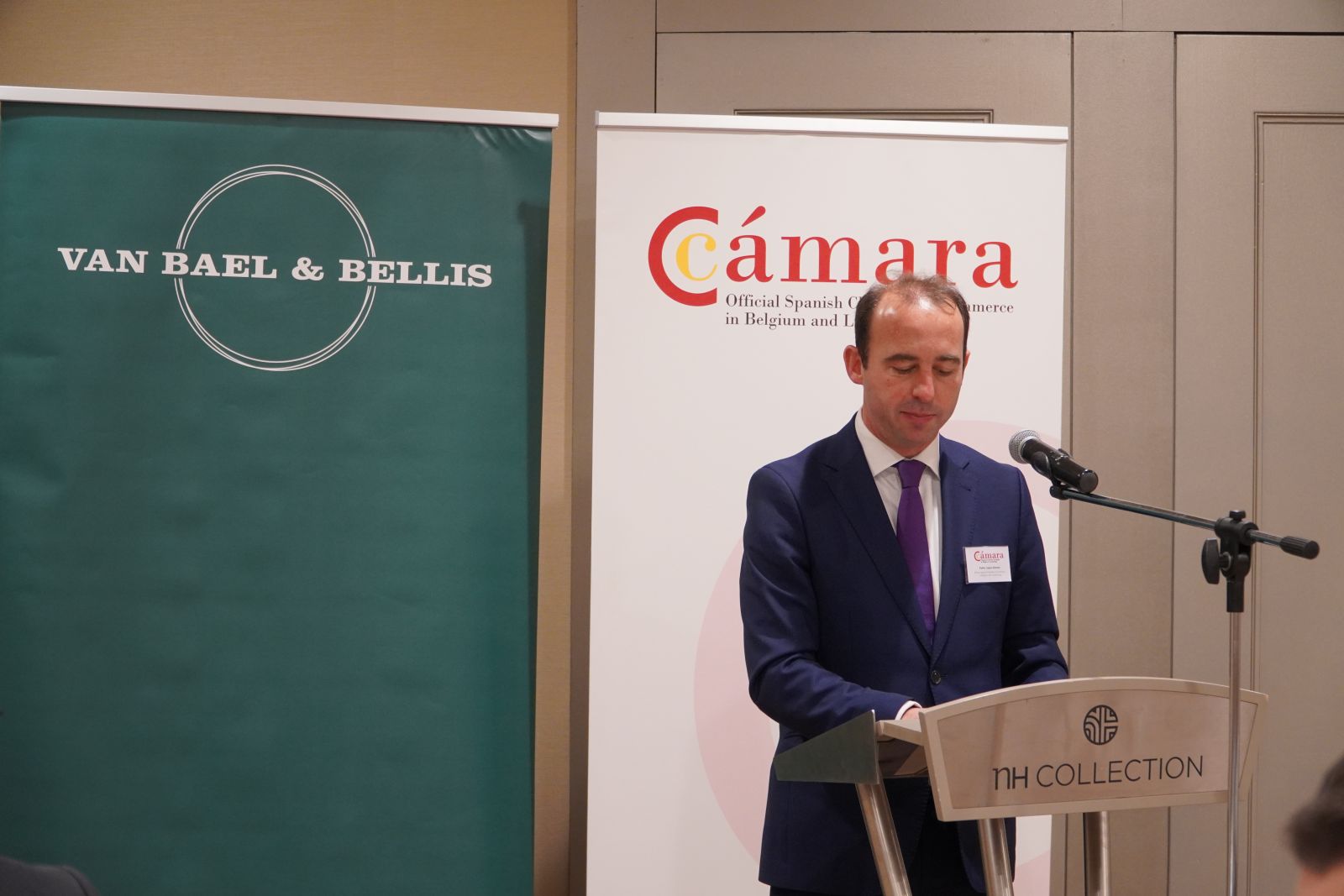Last Tuesday 22nd February, the Official Spanish Chamber of Commerce in Belgium and Luxembourg organised a new luncheon-debate with the participation of Gerassimos Thomas, Director General for Taxation and Customs Union – DG TAXUD at the European Commission. The theme of the event revolved around the role of the energy tax, the CBAM and the implications for customs authorities reflected in the new European Green Deal and was sponsored by the firm Van Bael & Bellis.
The conference was opened by Pablo López-Álvarez, President of the Chamber, who took the opportunity to thank all those present for their attendance, and then dedicated a few words of special recognition to the extensive career of the speaker Gerassimos Thomas and his long trajectory in European institutions. López-Álvarez also highlighted the complex situation Europe is facing in relation to energy and the importance of a regulatory framework adapted to the current context.
facing in relation to energy and the importance of a regulatory framework adapted to the current context.
The President of the Chamber also introduced Pablo Muñiz, partner at Van Bael & Bellis and sponsor of the event. Muñiz briefly introduced his company, a leading international law firm in European commercial law and international law, and highlighted the intense work that European regulators are currently facing in imposing different taxonomic tools in many different areas of activities, and then handed over the floor to Gerassimos Thomas.
Taxation tools
Thomas, dedicated his speech to explaining the different tax and regulatory tools currently available to the EU to meet the objectives set out in the European Green Deal, in relation to the reduction of greenhouse gases and the stimulation of environmentally friendly energy.
In this context, Thomas stressed that the package of measures promoted by the European Commission’s Executive Vice-President for the European Green Deal, Frans Timmermans, brought together the various political and administrative tools to address the challenges posed by the current climate situation.
Thomas also took the opportunity to stress the continued concern of the European authorities about the sustained increase in energy prices. He also pointed out that the best way to avoid future instabilities is to follow the path set out by the EU Green Deal and continue to focus on the transition to a supply system that comes from renewable sources and closer geographical location.
 Focusing on how European industries must transform themselves to adapt to the challenges posed by packages such as the Fit for 55, Thomas clarified that the answer cannot come from the regulatory framework alone, stressing that taxation tools can and should play a key role in providing concrete incentives for companies to move forward and adapt to the current situation.
Focusing on how European industries must transform themselves to adapt to the challenges posed by packages such as the Fit for 55, Thomas clarified that the answer cannot come from the regulatory framework alone, stressing that taxation tools can and should play a key role in providing concrete incentives for companies to move forward and adapt to the current situation.
Descarbonisation
With regard to the CBAM (Border Carbon Adjustment Mechanism), Thomas advanced that it will be a key tool for making external EU producers assume greater climate ambition when it comes to decarbonising their production processes in a similar way to that which European companies will be obliged to do. This will reduce the competitive advantage of companies located outside the European area and will encourage third countries to take concrete measures in the fight against global warming, thus promoting sustainable production.
Thomas dedicated the last few minutes of his speech to stressing the importance of compliance by European importers with all regulatory measures regarding products entering the common market. He also highlighted the constant coordination of the European authorities with the economic and productive sectors most affected by the energy transition and the importance of advancing in this transition in a coordinated manner, without forced impositions and an agreed timetable, thus promoting a stable commitment to the future.
After the presentation, a round of questions began, where the participants were able to express their opinions and ask different questions about what had been presented. Among the issues that aroused most interest were the doubts about the possibilities of not passing on the increase in energy prices to end consumers, as well as the importance of raising awareness among citizens to consume products that, although more expensive, are identified with the values that Europe wants to promote in relation to an environmentally neutral society.
From the Chamber we would like to show a special thanks to Atavus Priorat, whose wines IURA 2011 and Buen Karma 2019 could be tasted by all the attendees, as well as to the participants, for making this event a very successful lunch-debate.

 facing in relation to energy and the importance of a regulatory framework adapted to the current context.
facing in relation to energy and the importance of a regulatory framework adapted to the current context. Focusing on how European industries must transform themselves to adapt to the challenges posed by packages such as the Fit for 55, Thomas clarified that the answer cannot come from the regulatory framework alone, stressing that taxation tools can and should play a key role in providing concrete incentives for companies to move forward and adapt to the current situation.
Focusing on how European industries must transform themselves to adapt to the challenges posed by packages such as the Fit for 55, Thomas clarified that the answer cannot come from the regulatory framework alone, stressing that taxation tools can and should play a key role in providing concrete incentives for companies to move forward and adapt to the current situation.